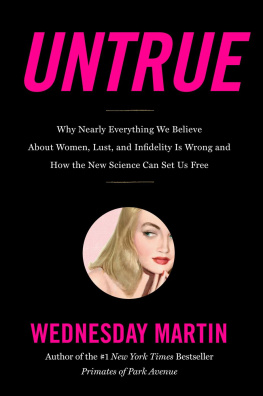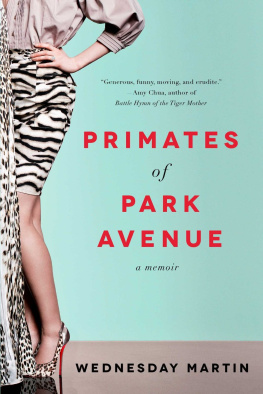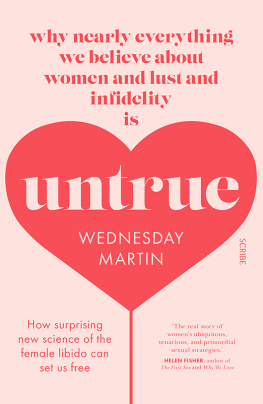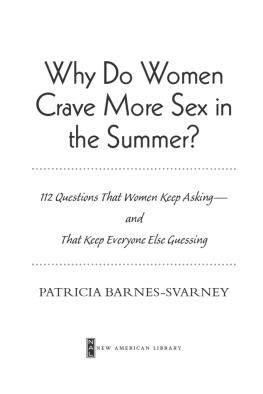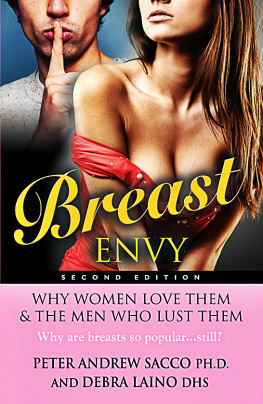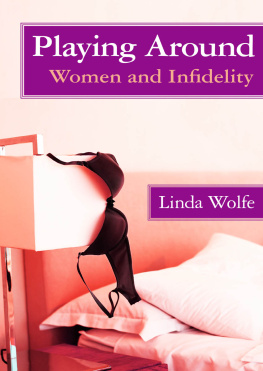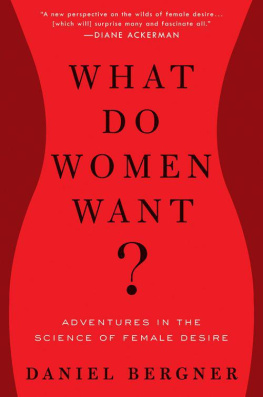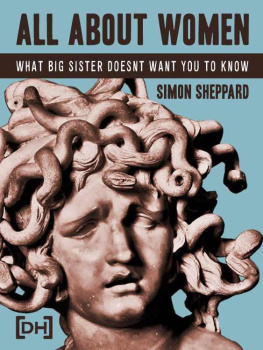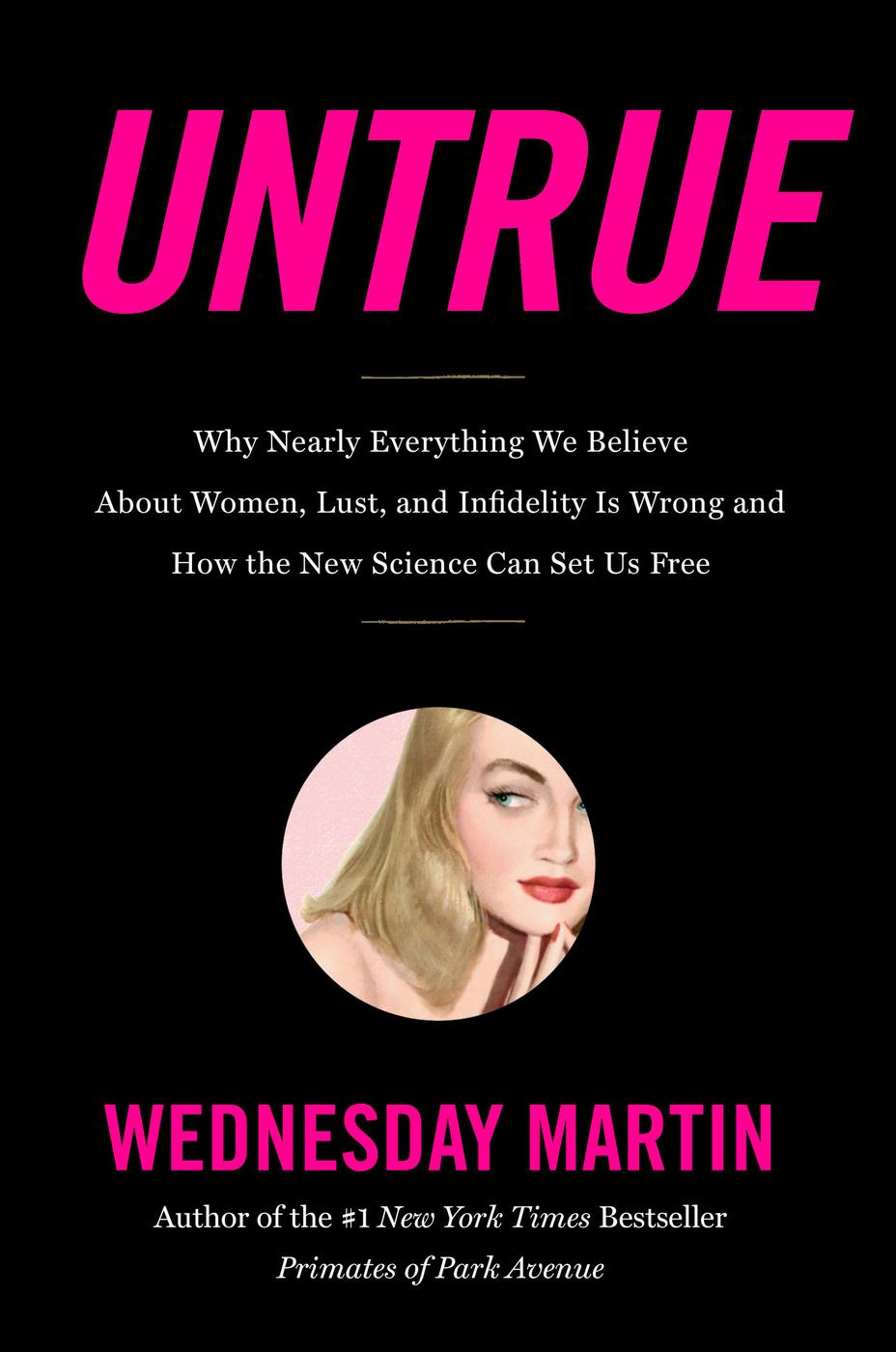
Certain names and identifying details have been changed.
Copyright 2018 by Wednesday Martin
Cover design by Gregg Kulick
Cover illustration by Al Moore / timetunnel.com
Author photograph by Don Flood
Cover copyright 2018 by Hachette Book Group, Inc.
Hachette Book Group supports the right to free expression and the value of copyright. The purpose of copyright is to encourage writers and artists to produce the creative works that enrich our culture.
The scanning, uploading, and distribution of this book without permission is a theft of the authors intellectual property. If you would like permission to use material from the book (other than for review purposes), please contact permissions@hbgusa.com. Thank you for your support of the authors rights.
Little, Brown Spark
Hachette Book Group
1290 Avenue of the Americas, New York, NY 10104
littlebrownspark.com
twitter.com/lbsparkbooks
facebook.com/littlebrownspark
First ebook edition: September 2018
Little, Brown Spark is a division of Hachette Book Group, Inc. The Little, Brown Spark name and logo are trademarks of Hachette Book Group, Inc.
The publisher is not responsible for websites (or their content) that are not owned by the publisher.
The Hachette Speakers Bureau provides a wide range of authors for speaking events. To find out more, go to hachettespeakersbureau.com or call (866) 376-6591.
Eula [] first appeared in Apogee.
ISBN 978-0-316-46364-5
E3-20180507-DANF
We do not even in the least know the final cause of sexualityThe whole subject is as yet hidden in darkness.
Charles Darwin, On the Two Forms, or Dimorphic Condition, in the Species of Primula, and on Their Remarkable Sexual Relations, 1862
Our worldviews constrain our imaginations.
Patricia Gowaty, distinguished professor of ecology and evolutionary biology, UCLA
Every sensible woman got a back door man.
Sara Martin, Strange Lovin Blues, 1925
Adulteress.
The word is charged. It scandalizes and titillates. The adult makes it sound grown up and serious, somehow, the territory of those with enough life experience and agency to know better than to do what they are doing. The ess is all crackle and hiss, the long, low whistle of femaleness and dishonesty rubbing against each other, a silk dress against a suit, creating a conceptual commotion. The adulteress has a noirish cast; she has stepped out of a 1950s divorce proceeding, perhaps. She wears seamed stockings. She is no kid, and no angel. And while we may judge her harshly, we have to admit she is anything but boring.
In contrast to adulteress and adultery, monogamy soundswell, it literally sounds like monotony. Monogamy also has the ring of something cozy to sit onCome on over and join me on the monogamywhich, after all, it is. Monogamy is our societys emotional, cultural, and sexual baseline, the place that comforts us. Sexual exclusivity is the turf, we tell ourselves, of the well-adjusted, healthy, and mature. Adultery and the adulteress are a wild swing away from this place we know, this reference point of security and safety. Seen this way, adulteress is not just sexy and interesting; it has a taxonomical, diagnostic ring to it, more than a tinge not only of the illicit and immoral but of illness. For good reason. Many psychologists, anthropologists, and scientists have virtually fetishized monogamy and the pair bond over the last several decades, insisting that it is naturally the purview of women, even going so far as to assert that the heterosexual dyad is the reason we humans came to rule, where other hominins bit the dust. From the notion promulgated by biologists that a womans egg is costly and finicky while sperm are a randy dime a dozen; to primatologists long unchallenged presumption (since Darwin) that males who benefit from having more than one partner compete for sexually passive females who seek one great guy; to mental health professionals and social scientists maintaining that human males and females are wired or destined or have evolved to do that very same gender-scripted dancejust about everything tells us that for women especially, infidelity is off the map and out of bounds.
And yet.
Women lust and women cheat. And it sets us aflame. Shere Hite took a hit, received death threats, and eventually went into exile in Europe after suggesting that 70 percent of us do. Other statistics range from as low as 13 percent to as high as 50 percent of women admitting they have been unfaithful to a spouse or partner; many experts suggest the numbers might well be higher, given the asymmetrical, searing stigma attached to being a woman who admits it. Who, after all, wants to confess that she is untrue? Whats clear is that several decades after the great second wave of feminism, with increased autonomy and earning power and opportunity, and now with all manner of digital connections possible, women are, as sociologists like to put it, closing the infidelity gap. Were just not talking about it.
At least not in a voice above a whisper.
I dont think you really even want to talk to me, because Im reallyunusual most of the women Ive spoken with begin by saying when we meet to talk. Whys that? I wonder.
Because I have a really strong libido. AndI dont think Im cut out for monogamy, they tell me, haltingly, one after another. We chat over coffee, in person, or on the phone. They fear they are going to throw the data with their freakish singularity. They think they are outliers. They are foreign to the tribe of women, they suggest and believe. But when woman after woman in a committed relationship tells you she is unusual, sexually speakingbecause she wants more sex than shes supposed to, because she feels compelled or tempted to strayyou cant shake the feeling that in matters of female desire, sexuality, and monogamy in particular, unusual is normal, and normal desperately needs to be redefined.
Untrue is a book with a point of viewnamely that whatever else we may think of them, women who reject monogamy are brave, and their experiences and possible motivations are instructive. Not only because female infidelity is far from uncommon but also because the fact of it and our reactions to it are useful metrics of female autonomy, and of the price women continue to pay for seizing privileges that have historically belonged to men. This book is not an exhaustive review of the literature on infidelity, though it does reference the dozens of articles and books I read in a range of fields in an attempt to get my arms around the topic. But for the many studies I cite that suggest female extra-pair sexual behavior is a social and reproductive strategy that has served females in particular contexts well over the millennia, there are other studies that argue or suggest otherwise. I am only your guide to my viewinformed by the social science and science to which I was drawn and to which I was referred by experts whom I believe are correcting bias in their fieldsthat what we today call female promiscuity is a behavior with a remarkably long tail, so to speak, a fascinating history and prehistory, and a no less intriguing future. And that it merits open-minded consideration from multiple perspectives. For too long we have handed our sexual problems and peccadillos exclusively to therapists and psychologists, presuming the issues to be personal, even pathologicalrooted primarily in our emotional baggage, our families of origin, our unique difficulties with trust and commitmentand presuming they have solutions. But these ostensibly most personal mattershow and why we have sex, why we struggle with monogamyhave deep historic and prehistoric underpinnings as well. Biological factors, social control, cultural context, ecologiesfemale sexuality and our menu of options are shaped by all these factors and more. Rethinking topics as complex as female infidelity and our often heated responses to it arguably requires multiple lensessociology, evolutionary biology, primatology, and literary theory are just a few discourses that can enhance our understanding, reframing the adulteress in ways that facilitate greater empathy and understanding of herand of ourselves.

